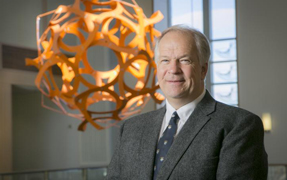SPIE President's Letter
As a professor at the University of Arizona College of Optical Sciences and as a member of SPIE, I have a deep interest in engaging students in optics and photonics and in seeing that begin early in the student's life.
Where optics is not taught along with other physics disciplines in pre-university programs, hands-on demonstrations led by volunteers can convey the excitement of optics.
Members of the 187 SPIE Student Chapters, including the one at my university, often provide such demonstrations. Using a laser to make a wheel spin, for example, teaches about energy conversion.
They go beyond just talking about principles and inspire kids to learn through their own experience.
We also offer a senior-level course for our engineers in which they present optics demonstrations at middle schools. Students gain experience speaking in front of a group and also have the opportunity to talk to young people about optics.
At our university, we also engage students who haven't yet decided on their majors to consider choosing optics. We try to pique their interest in optics through events demonstrating optical technology in lasers, animation, and other applications and by providing career information. Jobs are a real selling point starting salaries tend to be 30% to 40% higher for optical engineers than for mechanical or electrical engineers with BS degrees.
Optics and photonics students in the real world
Universities are continually finding new ways to prepare students. I recently visited the University of Rochester Institute of Optics and saw a program taught by SPIE Fellow Julie Bentley that matches student teams with outside companies to design, build, and test a product, following a real-world industry process. Julie reported that the teams find the experience to be extremely valuable in preparing them for their careers.
Internship programs are also a very strong part of the solution throughout the world and in Europe in particular. Even when the student's work is not highly technical, the experience of seeing first-hand what engineers do and how the multidisciplinary nature of the field can be applied to advance knowledge and improve life is very inspiring.
Synergy between industry and academia often results in new opportunities for students. Another SPIE Fellow, Anand Asundi, is helping to launch a new optical engineering specialization at Nanyang Technological University in Singapore. Establishing the program is an ideal way to develop a local workforce for the increasing number of optical companies setting up manufacturing in Singapore as well as provide technician talent for manufacturers there for whom optical technology is central to their products.
SPIE offers many programs for students
Informed and guided by the Society's members, SPIE programs demonstrate a commitment to the next generation of optical scientists. SPIE funds a generous scholarship and travel grant program and partners with Newport Spectra-Physics in providing Research Excellence Travel Awards.
The conference experience itself offers undergraduate and graduate students exposure to new technical information via presentations as well as the opportunity to see state-of-the-art equipment in the exhibition. Networking is also vital to students' success. At SPIE events, students meet experts in their fields at SPIE-sponsored luncheons and receptions for early-career professionals. The SPIE Women in Optics group brings together groups with shared interests as well.
Professional development courses at these events, online, and at company work sites teach how to write and deliver a paper and offer tips for connecting with potential employers.
Idea-pitching challenges at SPIE Photonics West provide practice for aspiring optics entrepreneurs, with the winners receiving sponsorship from Jenoptik Optical Systems to attend a week-long entrepreneurship academy to further improve their business skills.
Student and early career professional leadership-training events are well established at SPIE Photonics Europe and Optics + Photonics and are being expanded at SPIE Defense, Security, and Sensing as it moves to Baltimore this year. (See more in SPIE Professional about events at SPIE Defense, Security, and Sensing.)
Optical engineering is all about solutions
Optical engineering is about solving problems, from finding potentially hazardous damage in bridges and buildings, identifying underground aquifers or oil fields, and remote monitoring of crop health to printing ever smaller and more powerful semiconductor chips, detecting hidden explosives, and targeting individual cancer cells.
For those of us established in the profession, one of the biggest challenges we face is to ensure that the next generation is well-prepared to solve these problems and advance the field, "feeding the pipeline," so to speak. The SPIE conference experience is an important part of the solution.
Eustace Dereniak
![]()
2012 SPIE President
Have a question or comment about this article? Write to us at spieprofessional@spie.org.
To receive a print copy of SPIE Professional, the SPIE member magazine, become an SPIE member.



